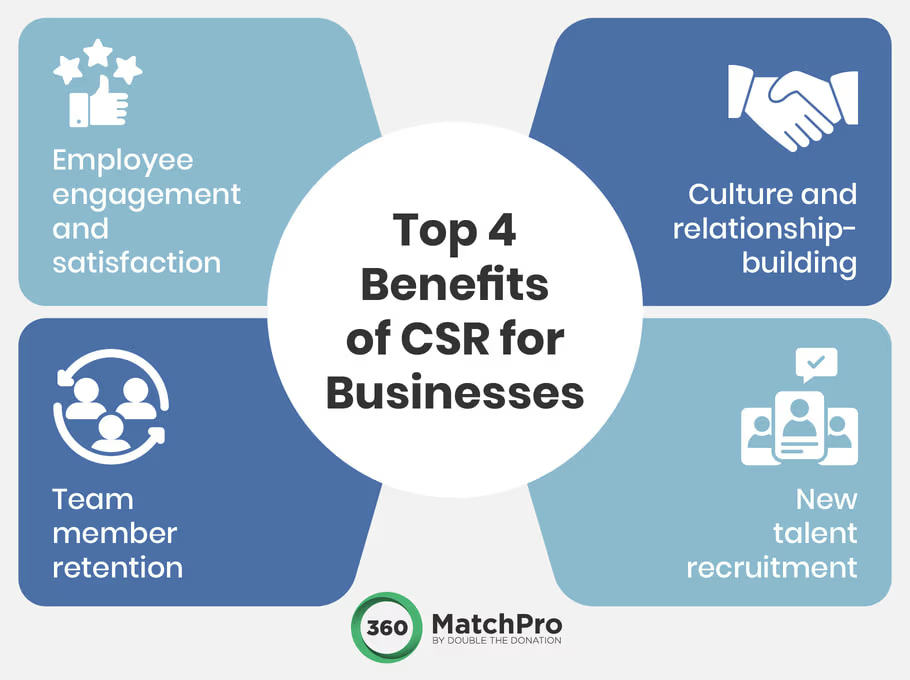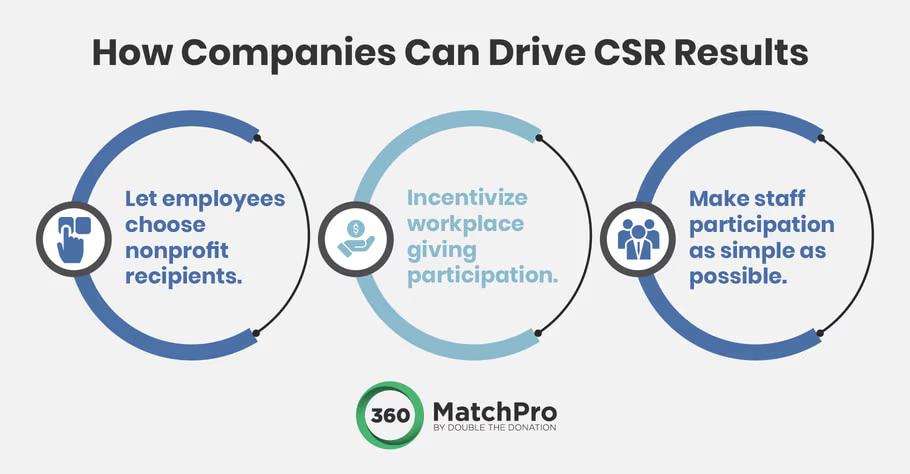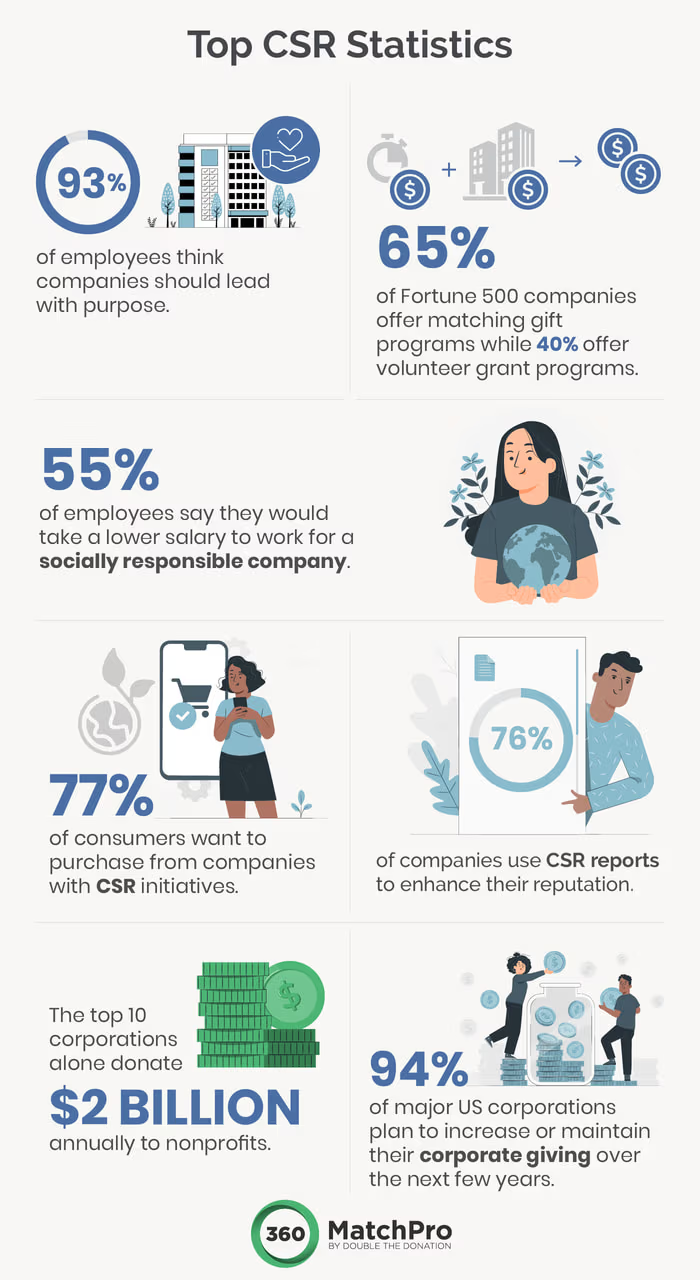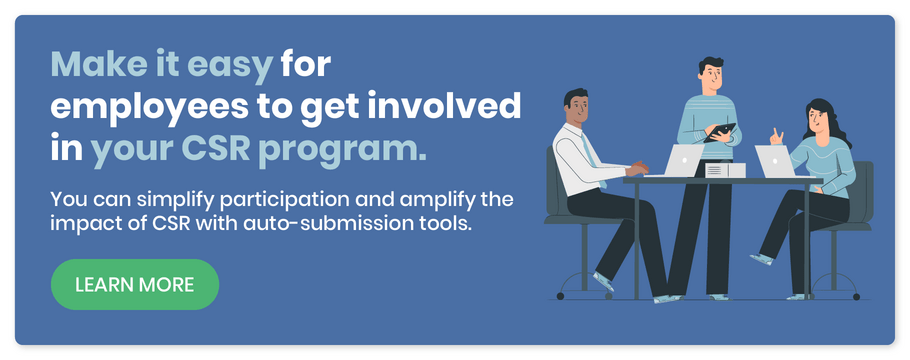Measuring the Impact of CSR: Top 4 Benefits for Businesses
Corporate social responsibility (CSR) is an essential component of many business strategies with many corporations using CSR to develop a positive brand image and drive sales. While highlighting your CSR efforts can enhance your marketing efforts and bottom line, there are other critical benefits for businesses and their communities.
In this guide, we’ll answer key questions about the impact of CSR and explore how real companies are using it:
- What Is CSR?
- What Advantages Does CSR Offer Businesses?
- What Can I Do to Drive CSR Benefits At My Company?
- Top 7 CSR Statistics for Businesses
- 5 Stand-Out Companies with CSR Initiatives
Whether you’re adapting your current CSR practices or diving into these initiatives for the first time, this article will offer insights into how your company can improve its approach and become a better corporate citizen.
What Is CSR?
CSR stands for corporate social responsibility. According to Double the Donation’s corporate social responsibility guide, CSR “describes a company’s efforts to improve society in some way.”
This concept relates closely to that of corporate philanthropy and giving directly to nonprofits making a difference in the world. At the same time, CSR also encapsulates the following elements:
- Environmental leadership initiatives, such as reducing carbon emissions and prioritizing recyclable resources
- Ethical labor practices, such as providing competitive salary and benefits packages to employees
- Economic responsibility practices, such as keeping up with taxes and staying above board with finances
Blending together social, environmental, and economic initiatives, CSR allows businesses to make a huge impact on charitable causes and society as a whole.
What Advantages Does CSR Offer Businesses?
While it’s clear that CSR benefits nonprofits by providing additional funding and support, CSR also benefits the businesses that put these practices into action. These advantages for companies include:
1. Employee Engagement and Satisfaction
Cultivating a positive workplace culture and developing strong interpersonal relationships between employees, managers, and company leaders is a high priority for many businesses—and for a good reason.
CSR-focused events such as team fundraisers and nonprofit volunteerism provide excellent opportunities for employees and leadership to get to know one another in an out-of-office environment. It’s no wonder many businesses utilize volunteer opportunities as team-building activities!
Additionally, employees who engage in team-building outside the office can transfer those skills to the workplace. As a result, they’ll have a better understanding of their coworkers’ communication styles and work more efficiently as a team.
2. Culture and Relationship-Building
Ensuring a positive workplace culture and developing strengthened interpersonal relationships between employees, managers, and company leaders is a high priority for many businesses—and for a good reason.
CSR-focused events such as team fundraisers and nonprofit volunteerism can provide excellent opportunities for employees and leadership to get to know one another in an out-of-office environment. It’s no wonder many businesses utilize volunteer opportunities as team-building activities!
3. Team Member Retention
In addition to increased employee satisfaction and engagement, companies participating in corporate social responsibility also tend to see significantly elevated rates of employee retention year over year. The concepts are related—individuals who are highly engaged in their companies and feel valued by their employers are less likely to go from one workplace to another, rather opting to stay with the same business for years on end.
At the same time, much of the workforce is switching jobs at higher rates than ever before. The idea that individuals want to work for socially responsible companies is at the forefront of many minds. Companies with robust CSR programs are less likely to have staff leave to seek out these initiatives elsewhere.
4. New Talent Recruitment
When you need to hire help for a role, you want top talent; CSR initiatives add value to your compensation package to help you recruit new team members. Whether you’re recruiting younger generations of individuals joining the workforce for the first time or attracting team members from other companies, CSR initiatives can play a huge role in your level of success.
We already mentioned that millions of individuals are seeking employment with CSR-focused companies. In fact, re:Charity reports that over 77% of Millennials indicated that their company’s sense of purpose is one of the reasons they chose to work there.
Again, employees want to work for businesses they feel positively about, and they want to know that their own contributions to their employers’ bottom lines are being used for good. By highlighting your company’s social impact from the beginning, you can attract highly competitive candidates to your business.
What Can I Do to Drive CSR Benefits At My Company?
Now that you understand why CSR is essential for your business, you’re ready to do what you can to elevate the positive impacts on your company. But what are some tangible steps you can take to get there?
Here are a few tried-and-true best practices to maximize the impact of CSR:
1. Let employees choose nonprofit recipients.
Corporate philanthropy—and specifically, donations to nonprofits—will likely be a significant component of your CSR strategy. Keep in mind, however, that the specific organizations you support can have a direct impact on your company’s success.
As the leader of your company, you could determine the causes that your corporate dollars will support. However, you’re likely to see significantly greater benefits if you allow employees to have a real say in the process.
For this reason, many companies invest in workplace or employee giving programs that allow individual team members to take an active role in the causes their employer supports. Two common examples of these program types are matching gifts and volunteer grants. In both cases, a company’s employees kick off the process by contributing their own time or money to the charities of their choice, which the company then “matches” with corporate donations.
This strategy gives individual employees a hands-on part in their company’s philanthropy and overall CSR.
Still, you might decide to opt for a custom or one-off matching gift program instead as a way to ease into employee giving and overall social responsibility. In that case, your company would select a particular nonprofit to support but engage your staff in the giving opportunity nonetheless by raising money for the cause together.
Note: While 360MatchPro offers custom matching gift program management functionality, this feature is designed specifically for fundraisers looking to manage custom matching gift initiatives—360MatchPro does not work directly with corporations. If you’re a company interested in creating a matching gift program, contact us, and we’ll share information about our corporate vendor partners.
2. Incentivize workplace giving participation.
Offering to give corporate dollars to employees’ favorite charities is a significant incentive in and of itself. However, if you want to further drive participation in these giving programs, we recommend incorporating a number of fun incentives and rewards for employees who partake in them.
These incentives may include additional paid time off to participate in CSR initiatives, badges and awards that recognize workplace giving participants, and clear goals—such as a dollar amount raised or a percentage of team members participating—with pre-determined prizes at various levels.
Your employees will be happy to take part in your new CSR and corporate giving efforts, and adding a little extra push can be just what they need to make the leap.
3. Make staff participation as simple as possible.
To encourage staff to participate in your CSR initiatives (and particularly workplace giving programs), it’s best to simplify participation as much as possible.
Provide employees with detailed, step-by-step instructions to guide them through the process from beginning to end. Additionally, create as many ways for team members to participate in the initiatives as possible.
In terms of matching employee donations, for example, it’s important that you agree to match all sorts of gifts—including ones made on a nonprofit’s website, through direct mail, and via a peer-to-peer platform. The more options an individual has to make their initial donation, the more likely they will follow through with the giving process, and the more positive their overall giving experience will be.
You can also make it easier for employees to participate by investing in CSR software. These types of platforms organize your CSR initiatives by housing all related information, documents, and processes in the same place, helping you manage:
- Employee donations
- Automatic payroll deductions
- Matching gift requests
- Volunteer hour logs
- Volunteer grant requests
- Team volunteer opportunities
- Company CSR metrics
When choosing a platform, look for one that integrates with matching gift auto-submission tools. Check out how auto-submission simplifies CSR program participation:
With auto-submission, employees can send your company matching gift requests from their nonprofit of choice’s donation page in just a few clicks. All they have to do is input their corporate email address, and the software will send the request to your CSR platform.
Top 7 CSR Statistics for Businesses
Quantifying the impact of CSR can inspire companies to get involved. Check out these statistics that demonstrate the power of CSR in influencing business outcomes:
- 93% of employees believe companies should lead with purpose. Employees don’t just want to clock in and clock out each day. They want to work for companies that are making a real difference in the world through dedicated CSR efforts.
- 65% of Fortune 500 companies offer matching gift programs while 40% offer volunteer grant programs. The two most popular forms of CSR are matching gifts and volunteer grants. These programs make it easy for employees to get involved and work together with their employers to support worthy causes.
- 55% of employees claim they would take a lower salary to work for a socially responsible company. Some recruiters would be shocked to know that salary and benefits are no longer the top priority of job applicants across the board. Employees also want to work for businesses that are socially responsible, so much so that many would be willing to sacrifice a higher salary to do so.
- 49% of individuals state work commitments are their biggest obstacle to volunteering. Conversely, only 30% state their reason for volunteering as having time to do so. The result? 67% of survey respondents say that having paid time off work to participate in volunteer activities would make for a positive employee volunteer experience.
- 77% of consumers aim to purchase from companies with CSR initiatives. Many consumers want to ensure that their hard-earned money goes toward businesses that use their revenue for good. By promoting your CSR efforts on your website, social media, and newsletter, you can demonstrate your commitment to social responsibility for your customers.
- 76% of companies use CSR reports to promote a positive brand reputation. It’s clear that a variety of stakeholders benefit from CSR, including nonprofits, employees, and customers. When companies report on their CSR programs, they can portray their businesses in a positive light.
- The top 10 corporations alone donate $2 billion to nonprofits each year. Think about what nonprofits can do with that substantial amount of funding. Your company could be a part of the growing community of corporations that help charitable organizations maximize their services and social impact.
- 94% of major U.S. corporations plan to increase or maintain their corporate giving over the next few years. The top companies know that corporate giving and CSR in general are the way of the future. The vast majority of U.S. corporations are continuing with their corporate giving efforts to assist nonprofits and glean the business benefits of CSR.
If your company is new to CSR, don’t worry! You can take small steps toward your CSR goals, such as surveying your employees about their favorite nonprofit causes, to start your journey. Before you know it, you’ll be amplifying the positive impact described in these statistics.
5 Stand-Out Companies with CSR Initiatives
Before you begin your CSR efforts, it’s helpful to see what other companies are doing to prioritize social good. Take a look at what these five stand-out companies are doing:
Coca-Cola
Through the Coca-Cola Foundation, Coca-Cola has contributed over $1.5 billion in grants to worthy causes. The company’s main CSR focus areas include access to clean water, disaster response, economic empowerment, circular economic practices, and local issues affecting the company’s hometown, Atlanta.
The company also features an employee giving program that offers matching gifts and volunteer grants. Coca-Cola generously matches employee donations at a 2:1 ratio to maximize support for team members’ favorite causes.
Spotify
Spotify’s website clearly outlines the three main components of the Spotify Gives Back program: donation matching, Dollars for Doers, and an impact day—one paid day per year for employees to volunteer at a nonprofit. Between employee matches and grants, Spotify has committed to contribute over $20 million to charitable causes since 2020.
Spotify also has a variety of nonprofit partners that it works with to support its favorite causes, including climate action, civic engagement, mental health, employee wellbeing, and gender and racial equity. For example, Spotify has partnered with UNICEF to find creative ways to support the mental health of young people affected by war. On the platform itself, Spotify aims to “amplify and celebrate creators from underrepresented and historically marginalized communities all year round and to uplift these communities and their causes.”
Pfizer
In 2023, The Ethisphere Institute named Pfizer one of the World’s Most Ethical Companies. The main pillars of Pfizer’s Ethics & Compliance Program include:
- Culture, governance & organization
- Risk assessment & mitigation
- Policies & processes
- Training & communications
- Monitoring
- Investigations & corrective action
- Third-party management
Through this program, Pfizer “supports [its] commitment to enable an ethical, sustainable, and responsible business model to advance [its] purpose, drive innovation, and deliver positive impact to patients and other stakeholders.”
Pfizer’s corporate giving program Give Forward encourages employees to give back to their favorite causes. Through this program, Pfixer offers matching gifts, volunteer grants, and disaster relief donation matches. The company also invites employees to become Global Health Fellows and engage in skills-based volunteering for health-related nonprofits.
Wells Fargo
Wells Fargo is committed to helping a variety of worthy causes. Mainly, the company focuses on diversity and inclusion, economic empowerment, environmental sustainability, and community giving. Wells Fargo has robust reports about its CSR efforts, indicating their goals, such as reaching net-zero greenhouse gas emissions by 2050 and increasing diversity at all levels of the company.
Through its philanthropy program, Wells Fargo contributes to the causes their employees care about. Something that makes Wells Fargo’s program stand out is its focus on volunteerism. The company offers employees 16 hours of paid volunteer time per year, organizes volunteer groups that collectively have over 100,000 employee participants, helps under-resourced communities develop entrepreneurial skills, and builds and repairs homes for low-income families.
Adidas
As an athletic wear company, Adidas centers its CSR efforts around sports. The company provides sports coaching for women without direct access to it, donates its leftover products to the Global Aid Network and Ora Kinderhilfe, works with organizations that promote diversity in sports, and builds playgrounds and sports courts in underserved communities.
Adidas also focuses on sustainability. The company’s sustainability goals include having nine out of ten Adidas articles be sustainable by 2025 and becoming climate neutral by 2050. Additionally, the company received an ESG Evaluation Score of 85 by S&P in 2022, putting it in the top ten S&P ratings.
Final Thoughts and Additional Resources
Whether you’re launching a CSR initiative at your company for the first time or you’re aiming to expand and develop existing efforts, starting with a solid foundation is a must.
When you incorporate these tips and steps into your CSR business plan, you’ll begin seeing the highlighted benefits making a tangible impact on your employees, nonprofits around you, and the world as a whole—not to mention your own bottom line.
Find out more about CSR, corporate giving, and other mission-driven business strategies with these additional resources:
- Corporate Social Responsibility: How to Make Your Mark. Learn about the ins and outs of corporate social responsibility, using CSR as a marketing tool, and how your business can benefit nonprofits with this comprehensive guide.
- CSR in Action: 7 Corporate Social Responsibility Examples. Looking for more inspiration for your CSR program? This article reveals even more examples of companies with effective CSR initiatives.
- Why Workplace Giving Matters for Nonprofits + Companies. Workplace giving initiatives benefit both companies and nonprofits greatly. Explore this Double the Donation guide to learn best practices and see the impact your company can make.




